Stories of Resettlement: Julia Bulinska
Published on September 09, 2023
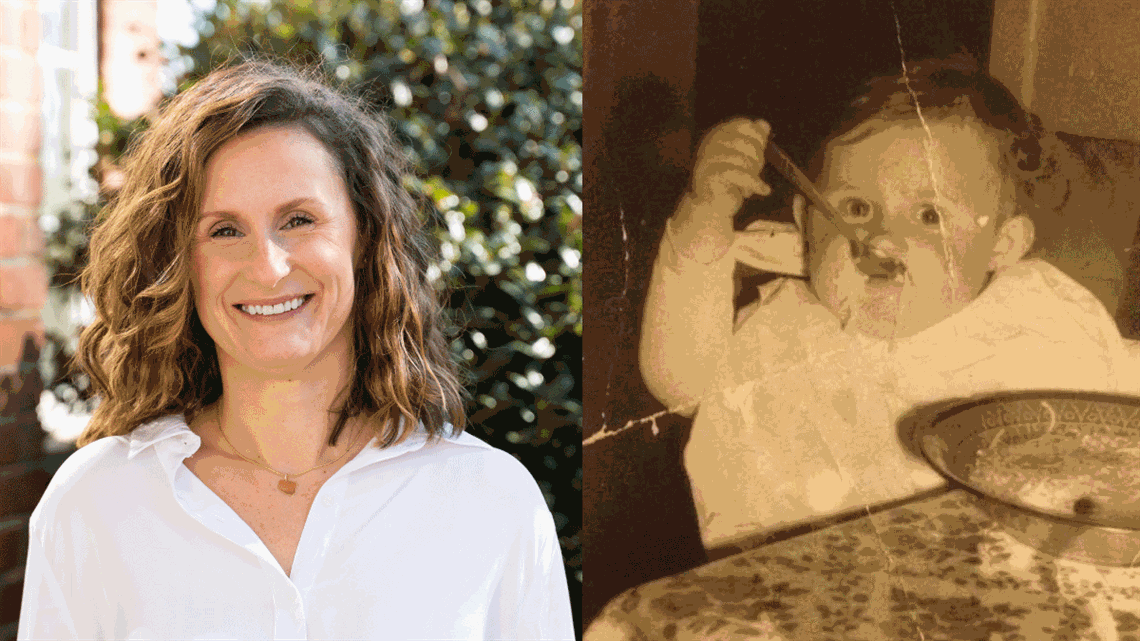
Born in Rawicz, Poland, and raised in nearby Gostyń, Julia Bulinska’s dream of living in the United States began at an early age. When she was about five years old, Julia packed up a suitcase adorned with pictures of Michael Jackson—her favorite artist—and headed for America all by herself. Or at least that’s where she thought she was heading. She didn’t get very far before her older sister appeared at her side on a bicycle and told her she had to come home.
Back then, her dream was simple: she just wanted to be where Michael Jackson was. She’d follow him to the United States, where she could live the kind of life she’d seen in the movies. That was what she wanted. So, when the opportunity to leave Poland presented itself in 2005, she took a leap of faith and landed in Daytona Beach, Florida. She would eventually settle in Charlotte, North Carolina, the place she now considers home.
We recently sat down with Julia to learn more about her journey from Poland to Charlotte. The following responses come directly from Julia, and while they showcase important moments throughout her life, they only represent a fraction of her experience.
Just Like in the Movies
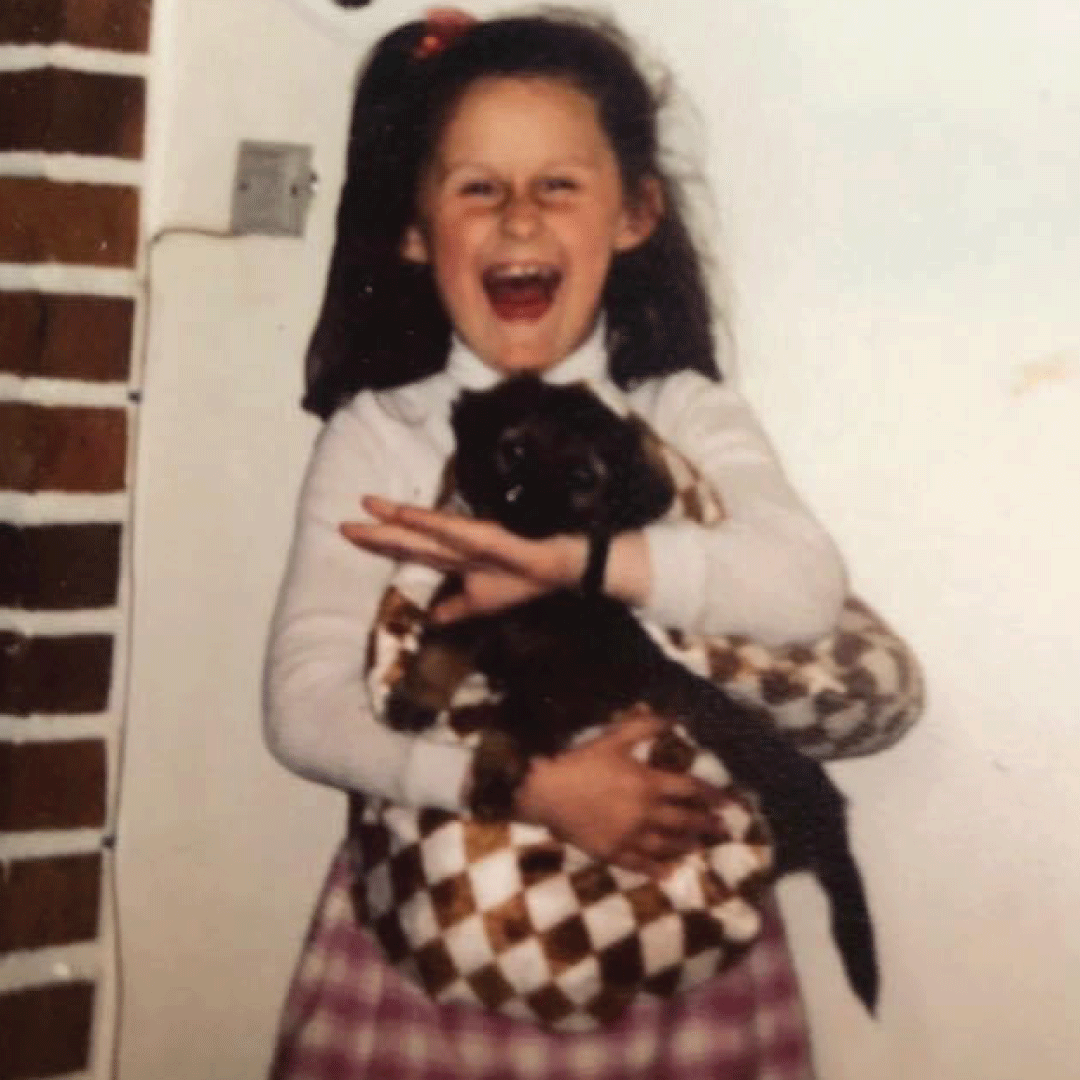
Julia Bulinska around five years old.
Did you come to America by yourself or did some of your siblings go with you?
No, by myself. Everybody was thinking that I’m crazy. Everybody. Every single person besides my mom. Everybody wanted to tell me it’s not a good idea. ‘Why are you doing this? Why America? Why so far? Why by yourself?’ I didn’t even ask if anybody else wanted to go. I didn’t want anybody to stop me and hold me down.
What was your first impression of the United States when you got to Florida?
Daytona Beach was a little much. It was a little bit much. I think it was during that Bike Week, the famous Bike Week maybe or something like that. So… But, no, it was everything that I thought it would be, to be honest with you. When I saw the palms… When you start thinking about all the movies that you watch as a child and wondering ‘How does America look?’ Yeah. It was pretty much what we’ve seen in the movies. Everybody was always asking me ‘Is it like in the movies, is it like in the movies?’ when I was finally making calls to let my family know that I’m alive. And I was like, ‘Yeah, it’s just like in the movies. The cars are like in the movies. People like in the movies. Palm trees. Buildings.’ Everything was just like in the movies that we’ve seen.
What were some of the biggest differences between Poland and the United States that you first noticed?
I think the first one I noticed is that you cannot walk everywhere. You cannot use public transportation everywhere. And that you don’t know anybody. There were a few, actually, now when I think about it. Food. Gosh. Food was a big one. Food was a really big difference. And that everybody had a car. In Poland, back then, it was not very common for people to have cars. They would have a car, but they would have one per family. Right? Suddenly, I come to America and see all these college students, each of them barely 20 years old, and each of them has a nice car.
Did you already know English before you left Poland? Or did you have to jump in and learn it right away?
So, I consider myself lucky in that sense, because my parents from the earliest ages, they were telling us ‘You have to learn English.’ It was not that popular in Poland. But for some reason, my parents had that understanding of the world, and they kept telling me… I remember as a young child, I was like ‘I don’t want to go’ because it was always outside of curriculars, outside of school, but they said, ‘You will see. It’s going to open so many doors and is going to be so good for you.’ I think I started learning English when I was 10 years old. Me and my sister were in private classes, so we had to go there before or after our regular school.
Finding Community in the Carolinas
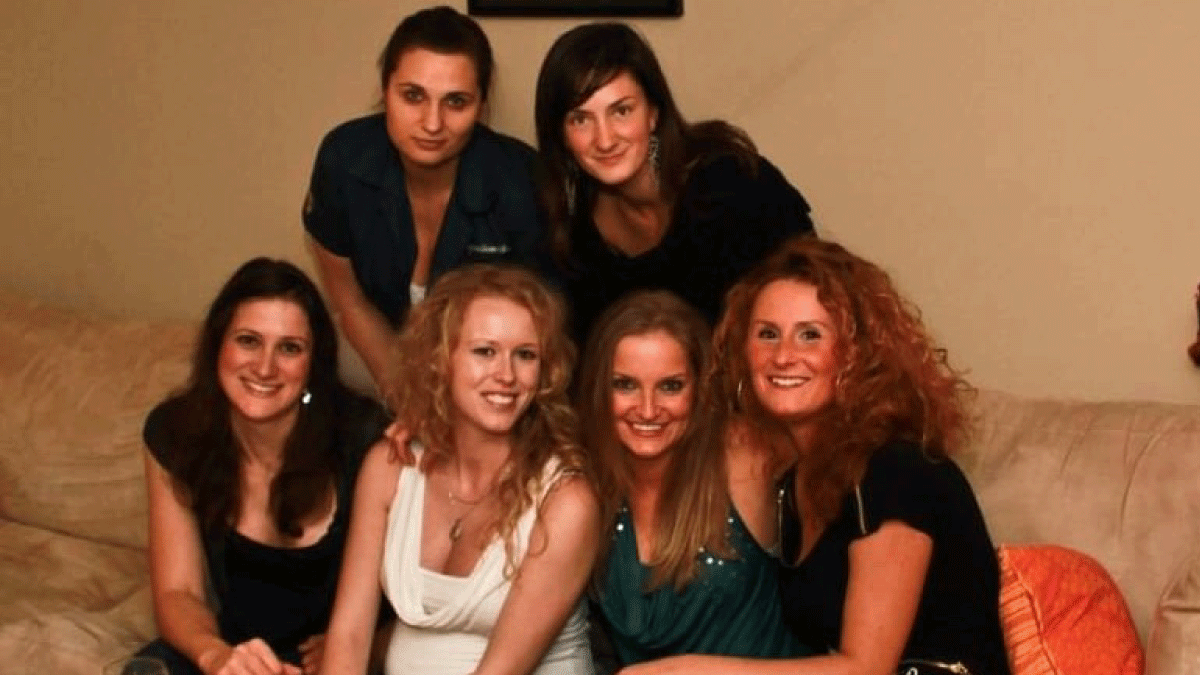
Bulinska (bottom row, right) with friends at Myrtle Beach.
You eventually left Daytona Beach and ended up in Myrtle Beach. What brought you to Myrtle Beach?
So, the first summer I spent in Daytona Beach, it was just a few months. Then I went back home. But once I got back to Poland, I knew that was it. I can’t live here anymore. So, I did everything… I continued my college there and I did everything to go back. So, again, I sign up with [Travel Polska] and this time around they sent me to Myrtle Beach, South Carolina. You don’t hear a lot in Poland or in the movies about Myrtle Beach. So, I remember I looked at them and I was like, ‘Where is that?’ And they said, ‘There’s an ocean. Don’t worry, you’ll have fun.’ And Myrtle Beach was great, because in Daytona Beach, I noticed that there was a huge turnover of people. In Poland, we’re used to building friendships and they stay. Nobody moves from the town. Nobody, you know, sells their house. They’re not very migrant. So, that was one of the big cultural shocks for me too. When I realized that, I was like ‘What do you mean? How are we going to maintain our friendships?’ And that’s why I like Myrtle Beach, because people were coming there for longer period of time. So, I decided to settle there.
So, you settled in Myrtle Beach but now you’re in Charlotte. Why did you decide to leave and come here?
Myrtle Beach, for me, was kind of finished. Like, there was nothing else for me there to keep me. And actually, my friends, they decided that they were moving to Charlotte and they wanted to open a business. And they did open a Polish restaurant back then. We were very close friends, and you know, one weekend I missed them. I went to visit them and help them out. After the weekend, me and my friend both looked at each other, and she said, ‘Why don’t you just come live with us here? Why don’t you just come help us out here?’ So, I did that. Within the next weekend I was already packed, and I moved to Charlotte.
What was it about Charlotte that made you want to stay? What was your first impression of the city?
I felt the opportunities. I felt it right away. I was researching universities. I fell in love with The University of North Carolina at Charlotte. I knew that I wanted to continue education, and so that was my first thing. The opportunities. I felt that I could do something more. I can focus more on my career and actually gain experience here. So, yeah, that’s what kept me here.
Opportunities in Education
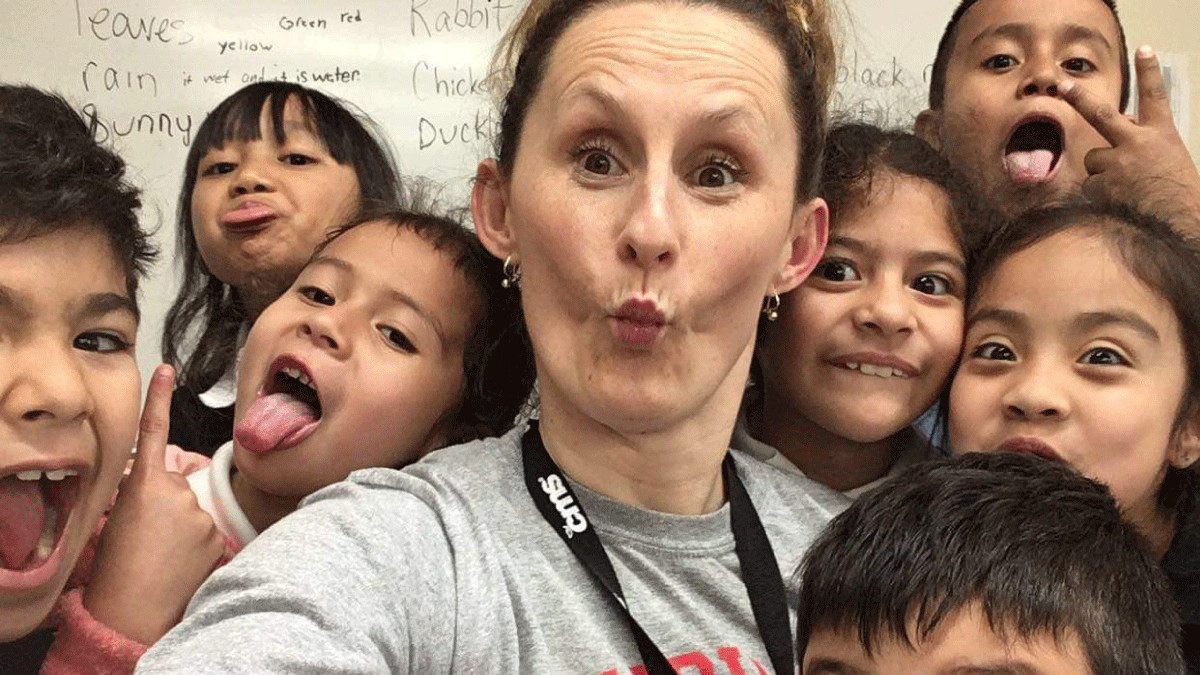
Bulinska with young students.
You mentioned your career. Can you tell us a little bit more about your role as the Director of Education and Workforce Development at International House? Was that something you had your sights set on when you were going to school or something you discovered you loved along the way?
International House played a huge role in my career. Because when I moved to Charlotte, I think I was here a few months, I started feeling that I want to give back to my immigrant community. Let me just at least volunteer somewhere, right? So, Mr. Google, tell me what’s going on in Charlotte. And the first organization that caught my eye was International House. So, I reached out and said, ‘Hey, I would like to volunteer.’ I knew I wanted to teach, but I was not set on what I actually wanted to do when teaching. Yet they reached out to me, and they said, ‘Yes, we are more than welcome to have you as our adult ESL teacher’s assistant.’ Great! The first class, when I was supporting that teacher out there, I fell in love. I was like, that’s what I want to do. So, from that moment, from 2013 when I started volunteering here, I just stayed. No matter what other jobs I would have or, of course, schooling I had, I would just continue my work here. But that allowed me to help pick my degree. Because even though I knew I wanted to do my master’s degree, I was unsure in what area of teaching. And that moment when I found myself in the classroom teaching other immigrants English, I realized this is exactly what I want to do. So, I applied to my master’s in teaching English as a second language and yes, the rest is history.
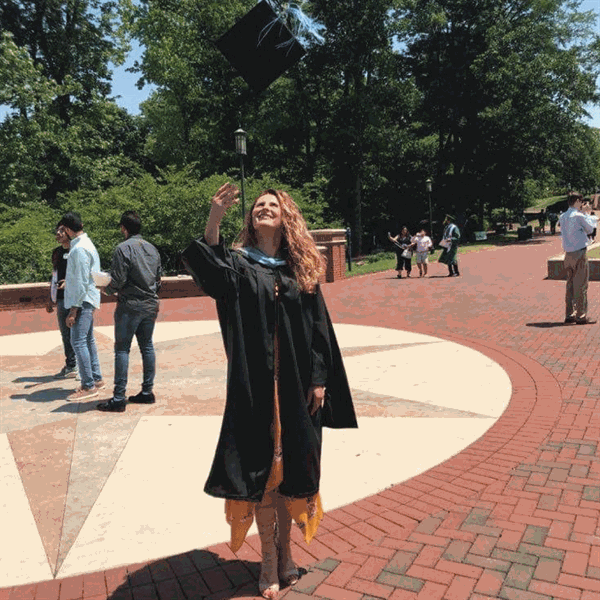
Bulinska celebrating UNC Charlotte graduation.
How has your role within International House evolved into what it is now?
My job is an accumulation of everything that I’ve done here since 2013. Because I started as a volunteer teacher’s assistant, then I became a tutor for one of our summer programs—Rising Readers. Then, in Rising Readers, I also became a site coordinator. From site coordinator, I became a school community coordinator. So, from 2013 until I became a director here at International House, I’ve done all the position that I’m actually now overseeing, and I went through all the programs that I’m overseeing right now.
A Welcoming City
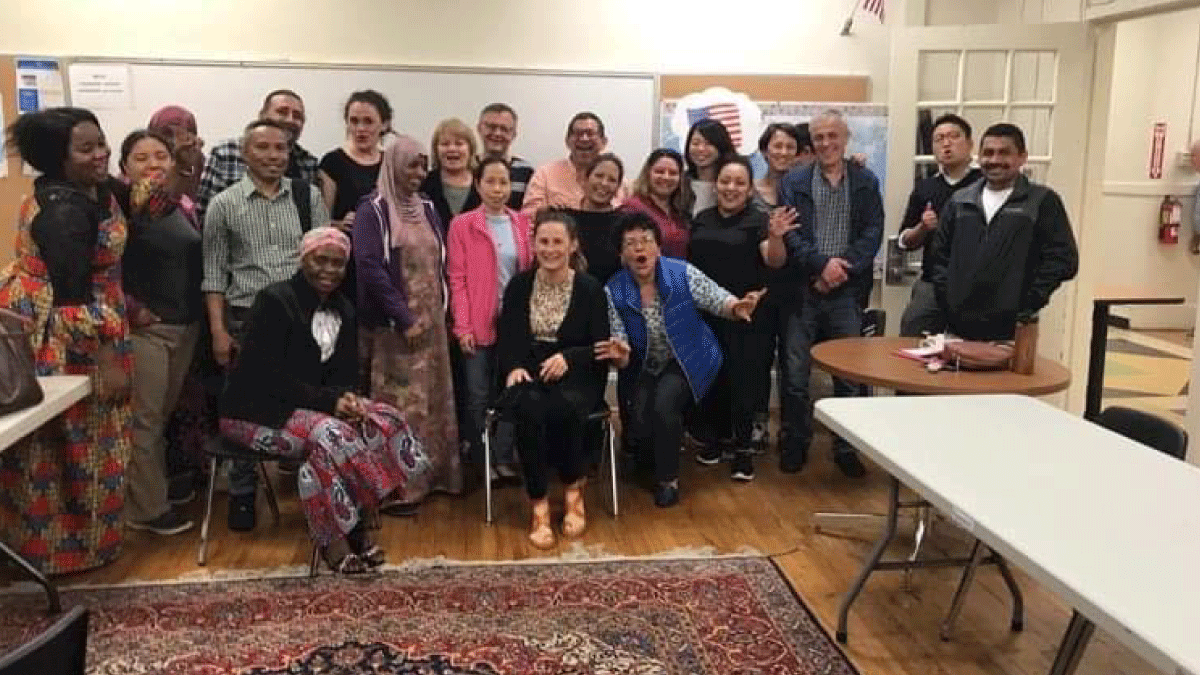
Bulinska (seated, middle) with adult English as a second language class.
As you know, Charlotte is a Certified Welcoming city. In your experience living in Charlotte, what are some things you’ve noticed that make this city feel welcoming?
I think organizations like International House. We have a lot of organizations like this one, because that’s the first place that I felt I belong. Just volunteering, right? Because I found my place, I found my community. It wasn’t strictly Polish. It wasn’t strictly teaching. But it was all foreign-born people in one place with different parts of their lives that they needed help with. So, I definitely think organizations like this one.
On the flip side of that, what are some things you’d like to see that would make Charlotte more welcoming?
I think more cultural events, city-wide events. Here at International House, we already do People of the World events. So, once every month, we focus on a certain country to bring people together from that specific country but also to bring exposure to other people about that country. I think cultural events where they actually bring people together, and not just people a specific group but everybody, everybody can learn from each other. Because I feel like we all have certain biases, right? We sometimes just have them inside of us, whether that depends on where we were raised, how we were raised, and all of that, but once you get to know people from different parts of the world, you realize that we’re all the same. We all have the same problems. We’ve very similar. So, I am a huge fan of exposure. I think that if there’s any confrontation and any, maybe, pushback on any cultures or people in general it’s because our lack of exposure. I think that once we get to know a different country, we put ourselves in other people’s shoes, whether it’s culturally or in any other way, that makes us grow. That makes us be more empathetic toward people. That makes us understand better and live better together as a community. Because it’s not only Polish communities. We all live in the Charlotte community. There are so many foreign-born people here.
Now that you’re settled in Charlotte, do you consider this city your home?
Yes. Yes. But, again, because I found my place. Right? I found my place. I think that’s the biggest difficulty to people to find their place, find their community. So, once they find it, I think Charlotte is great.
Advice for New Residents
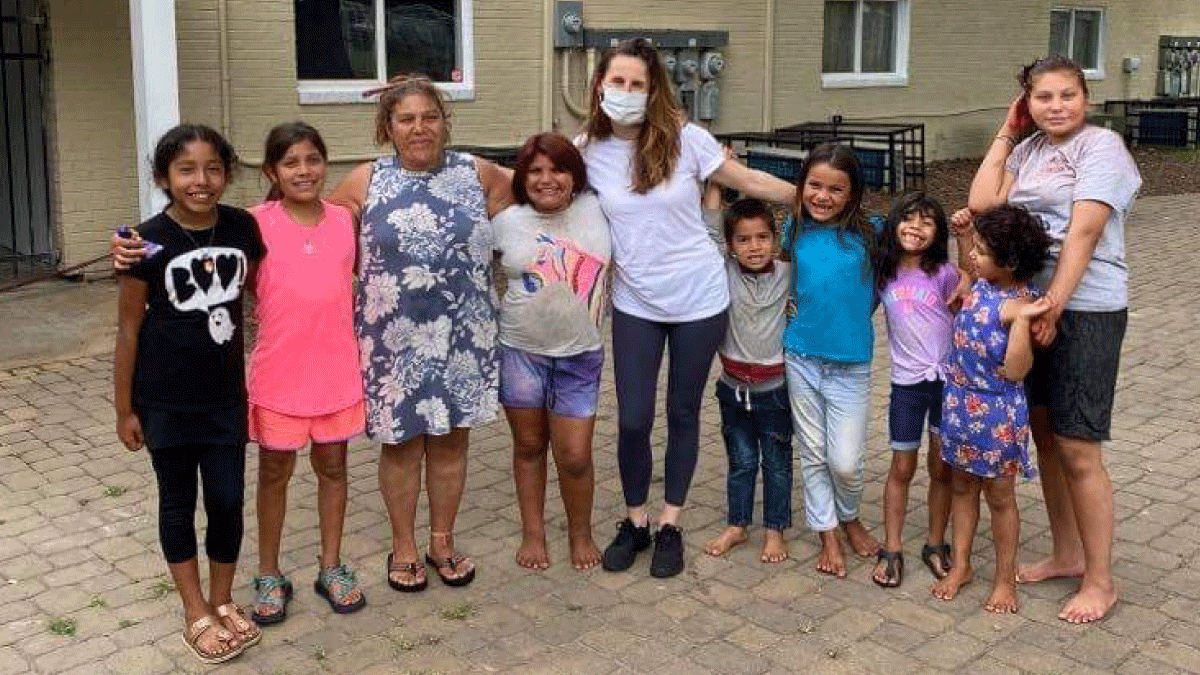
Bulinska in her role as International House site coordinator.
First, are there any good Polish restaurants around here for someone who is really homesick for Polish food?
No! There’s no more. My friends ended up moving back to Myrtle Beach, looking for different business ventures, even though their restaurant was very successful. It was amazing food. Yeah, now we’re waiting. Whoever is out there, whoever is in the restaurant business, you need to bring it back! Because every time when we meet with the Polish community, we always think, ‘oh where can I find this? Where can I find that?’ There is a Polish grocery store called Zygma. It’s in more of the Pineville area and it’s always very packed before any big Polish holidays. I try not to go there often, because somehow I am going there just for one bag of candy and then… ‘I missed this! I missed that! I can do that!’ You k
Do you have any advice for people who just arrived in Charlotte and aren’t really sure what to make of the city or where to go or what to do? What advice would you give them?
I would tell them to give themselves time. To give themselves time to try Charlotte, to network as much as they can, to look for things that they would like to do, because I bet they will find it in Charlotte. They just have to look for it. Charlotte is so big and growing so much that I believe there’s something for everybody here. I think the one other thing that I want people to know if just to take that risk. If there’s something in their heart that they have to do—maybe a change of place or career or anything—they just have to do it. Because in the end, we all figure it out. I came here with $500 in my pocket. I didn’t think that I would be staying. And when I think about where I am now and the journey I had to take, I would’ve probably said ‘oh no, I’m staying home.’ But we figured it out in the end, and we are so much happier when we take that risk. Especially if that risk for them is to come to Charlotte, then there’s nothing to worry about!
Julia Bulinska’s full interview is being donated to the oral history archives at UNC Charlotte’s J. Murrey Atkins Library. Additionally, if you would like to learn more about International House and other helpful organizations around the Charlotte area, please visit our Welcoming Charlotte Resettlement Resources.